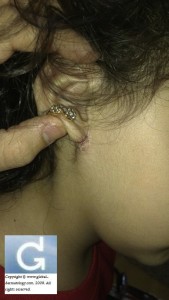What is Contact Allergy ?
Contact allergy is an allergic skin reaction from coming into contact with a substance that is usually harmless.
What are the common manifestations of contact allergy ?
The commonest manifestation is an itchy rash that develops over a few days, after skin contact with a substance. The affected area first becomes itchy, then red and swollen with blisters (vesicles).
Although usually confined to the area of contact, the rash can spread to other parts of the body.
Sometimes the rash is more chronic, manifesting then as an itchy patch that does not heal for weeks or even months. This usually occurs when there is repeated contact with the substance (a watch strap for example) . The rash resulting from contact allergy is called allergic contact dermatitis.
What are the common substances that can cause contact allergy ?
A substance that can cause contact allergy is called a contact allergen. Common contact allergens are:
- metals (nickel in watch straps, chrome in cement…)
- skin care products (fragrances, lanolin…)
- medication (flavine, neomycin…)
A skin test called a patch test is used to confirm contact allergy. The upper back is used as a test site. A small amount of the suspected contact allergen (diluted to a non-irritant concentration) is applied onto the skin in an aluminium chamber and sealed with hypoallergenic tape. Usually, several suspected allergens are tested simultaneously. They are left on the skin for 48 hours and read at 48 and 96 hours. A positive reaction indicates that he patient is allergic to the test substance. This is a very safe procedure.
Is it necessary to go through such a time consuming test ?
It often is. An example of the need for a patch test is when a skin rash has being present for a long time. Many skin care products and medication would have been tried. It is necessary to identify the cause of the contact allergy. A patch test will help to determine the cause with precision.
Another situation where a patch test is important is when a dermatitis is suspected to be due to work (occupational dermatitis). There are many substances in the workplace that may cause contact allergy.
Is there a cure for contact allergy ?
In many cases, removing contact with the incriminating cause (the allergen) will result in a cure.
Generally, once allergy to a substance has developed, it remains for life. As a consequence, any future contact with the substance will result in an allergic contact dermatitis coming back. Any future exposure would result in the allergic contact dermatitis coming back. This is exactly like a drug allergy. It is advisable for patients to carry a card to remind themselves and their doctors of their contact allergy.

